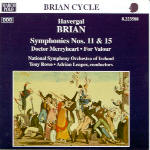Havergal Brian is a much better composer than passing acquaintance with the “Gothic” Symphony suggests. In fact, it’s very ironic that Marco Polo’s recording of that fascinating but intermittently successful behemoth should be far and away the most successful in the series in terms of popularity; the fact is, virtually all of Brian’s subsequent music is better. For anyone coming to Brian fresh, here’s the best place to start because the music on this excellent disc offers an overview of his whole career, chosen from strength and very well played and recorded.
For Valour is a big tone poem of Straussian/Elgarian ambition, scored for large orchestra with organ. It presents no problems to the listener at all, and if you like big, bombastic late-Romantic expostulations, then this baby’s for you. Doctor Merryheart is a theme and variations based on a program of the composer’s own devising (I needn’t quote it here; it’s thoroughly and engagingly discussed in the accompanying booklet). The music is delightful, and track 9 (titled “Dreams: Asleep in the Arms of Venus”) is as lovely and Romantic a passage as Brian ever penned, a sort of cross between Vaughan Williams and Wagner’s Siegfried Idyll. Anyone who believes that Brian’s music consists largely of clunky rhythms and overloaded climaxes swollen with brass and percussion should hear this charming and even graceful work.
The same observation holds true in the two symphonies. The vast majority of Brian’s works in this form are actually short, and it’s their concision and abruptness that makes them difficult at times for the beginner. You really have to pay attention all the time or you’ll miss something important. But at 24 and 23 minutes respectively, your powers of concentration will hardly be taxed here. Symphony No. 11 begins with a Brucknerian Adagio as Brian weaves a lovely web of serene string polyphony. Sleigh bells à la Mahler’s Fourth open the second movement, which is essentially a scherzo with slower interludes. The melodic material is simple, jolly, and easy to follow in all of its many permutations. The slow music gradually takes over, and as the music eases to a halt, a martial finale kicks in and winds the whole thing up in about four minutes of pomp and circumstance.
Symphony No. 15 has three big parts played continuously, and by now you should have a sense of Brian’s characteristic sound world. There’s the martial music for brass and percussion, his uniquely personal melodic use of xylophone and glockenspiel, those passages of seeming emptiness punctuated by flecks of harp and flute, as well as his love of “low” sounds–tubas, bassoons, double basses, and timpani. The present symphony culminates in a finale of rambunctious abandon; a drum-led dance alternates with slightly parodied waltz music. Really, there’s nothing at all difficult about any of this. It just doesn’t sound like anyone else. The important thing is that when Brian is really “on”, and he seems to be “on” more often than not, he’s one of the most interesting and gripping symphonists of the 20th century.
On the whole, the performances here are very fine. There are a couple of places in Symphony No. 15 where a little more virtuosity from the front desks (especially the first horn) wouldn’t have been amiss, but absolutely nothing detracts from our ability to enjoy the proceedings. Do try to make Brian’s acquaintance. His reputation as a “cult” composer has hurt him, and there’s so much more to his music than the “Gothic”. Marco Polo is undertaking a mammoth enterprise in recording his complete orchestral works. It’s a venture that deserves your support, and will reward your time and attention for years to come. Start here.
































